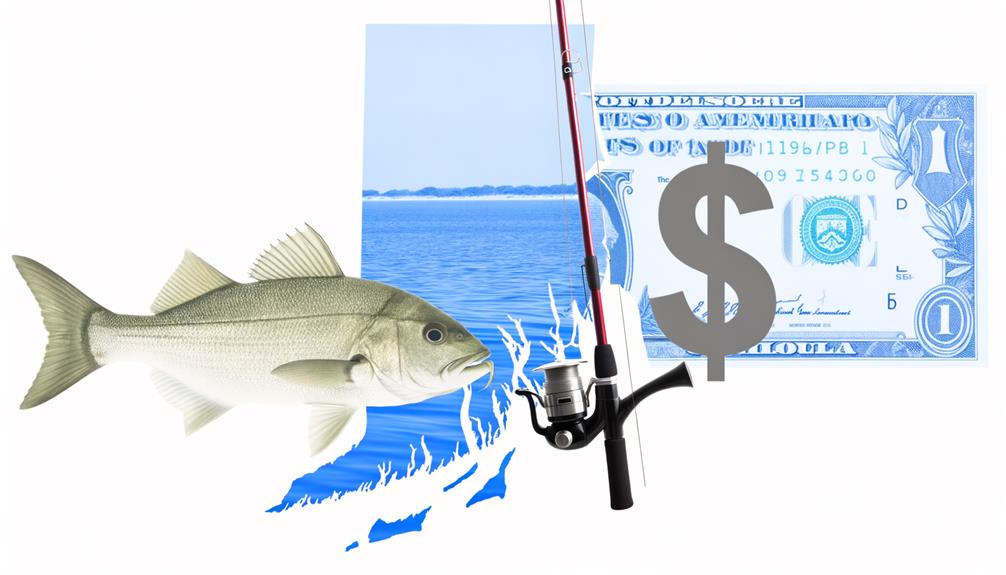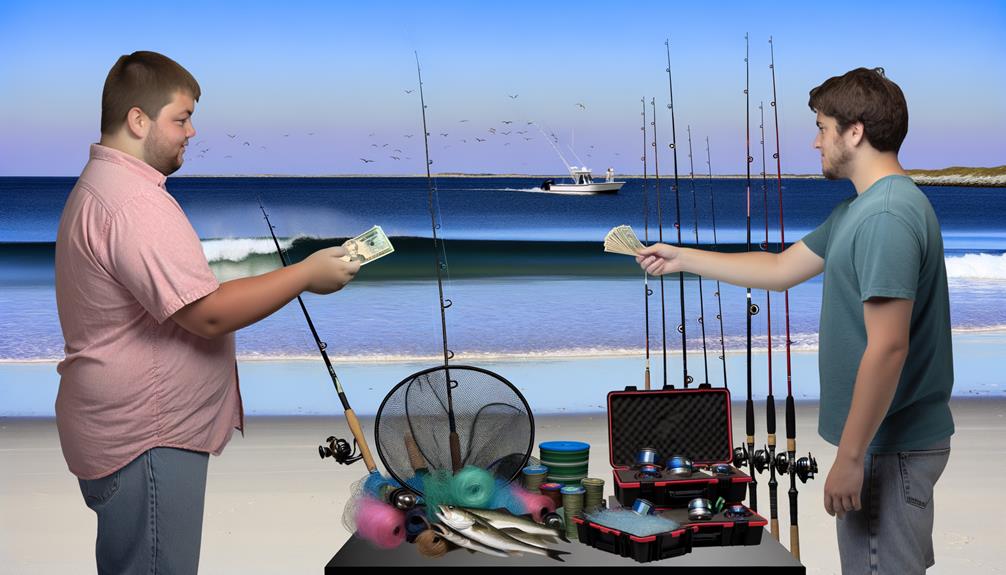The necessity of a saltwater fishing license in Rhode Island is an intriguing topic to explore, considering the various factors at play.
Rhode Island, like many other coastal states, has specific regulations regarding recreational fishing, including the requirement of a RI Recreational Saltwater Fishing License. However, exceptions exist, and alternatives to this license can be employed under certain circumstances.
The complexity of these licensing requirements prompts a deeper exploration into this topic, which could potentially uncover fascinating insights into the state's efforts to balance the interests of anglers with the need to protect and sustain their marine resources.
Key Takeaways
- In Rhode Island, a valid Saltwater Fishing License is required for anglers aged 15 and older.
- This license, costing $7 for residents and $10 for non-residents, permits fishing in marine and federal offshore waters.
- Exemptions apply for underage anglers, active military personnel, property owners fishing on their land, and individuals with disabilities.
- Licenses can be purchased online through the RI DEM website or in-person at local licensing agents or the Boating Licensing & Registration Office.
Understanding Rhode Island's Fishing Regulations
In order to partake in saltwater fishing in Rhode Island, it is vital to understand the state's specific fishing regulations, which are established and enforced by the Department of Environmental Management (DEM). This agency has the critical responsibility of managing the state's vast marine resources, ensuring sustainability and ecological balance.
A testament to this commitment is the requirement for a RI Recreational Saltwater Fishing License. This license, costing $7 annually for residents and $10 for non-residents, permits the holder to engage in the exciting world of marine fisheries in Rhode Island. DEM also offers licenses valid for 7 days at a cost of $5, a flexible option that caters to the needs of different fishing enthusiasts.
The essence of these regulations and the need for saltwater fishing licenses underscores the significance of compliance. Fishing in Rhode Island is not merely a recreational activity; it is an opportunity to contribute to the preservation and responsible utilization of the state's marine resources. Understanding and adhering to the DEM's fishing regulations is therefore not just a matter of legal necessity but an act of environmental stewardship.
Saltwater Vs Freshwater Licenses
Building upon the importance of licensing in Rhode Island's marine fisheries, it's crucial to distinguish between the licenses required for saltwater and freshwater fishing.
In the Ocean State, regulations mandate two distinct permits for these two types of fishing.
- Saltwater License: This grants Rhode Island residents and non-residents the privilege to fish in the state's marine waters. The license is also recognized in federal offshore waters and some state waters, thanks to reciprocal agreements with neighboring states. This means that holders of saltwater licenses from these states can fish in Rhode Island without needing an additional license.
- Freshwater Permit: Unlike the saltwater license, this permit is specific to freshwater bodies such as lakes, rivers, and reservoirs. Unlike the saltwater license, there are no reciprocal agreements in place for freshwater fishing.
- The Difference: Apart from the waters they cover, the main distinction between the two licenses lies in their exclusivity. A saltwater license does not grant permission to fish in freshwater bodies and vice versa.
Understanding the difference between these licenses is key to ensuring compliance and promoting responsible fishing in Rhode Island.
Cost of Rhode Island Fishing Licenses

Shifting focus to the financial aspect, the cost of Rhode Island fishing licenses varies based on the type of fishing and the residency status of the angler. For freshwater fishing, residents of Rhode Island can secure a license for $21, whereas non-residents pay a higher fee of $38. For those specifically interested in trout fishing, a Trout Conservation Stamp is available at a nominal cost of $5.50, allowing the angler to contribute to local conservation efforts.
When it comes to saltwater fishing licenses, Rhode Island maintains a different pricing structure. Residents can obtain an annual saltwater license for $7, while non-residents are charged slightly more at $10. For short-term fishing trips, there's also the option of a 7-day saltwater license, priced at $5 regardless of residency.
Additionally, a combination fishing and hunting permit is available for those interested in both activities. This combination permit comes at a cost of $38, providing a comprehensive outdoor recreational package for residents and non-residents alike. In summary, the cost of fishing licenses in Rhode Island varies, giving anglers multiple options to fit their fishing preferences and budgets.
Exceptions to the License Requirement
While the state of Rhode Island requires a license for saltwater fishing, there are certain exceptions to this rule that provide exemption for specific groups of anglers. These exceptions are in place to foster a sense of belonging and promote recreational fishing across different categories of people.
- Firstly, underage anglers, specifically those under 16 years of age, are not required to possess a Rhode Island saltwater fishing license. This exemption is designed to encourage young people to take part in the sport without the need for license procurement.
- The second exception applies to active military personnel on authorized leave, acknowledging their service to the nation. They are granted the privilege of fishing in Rhode Island's salty waters without the need for a license.
- Lastly, property owners who wish to fish on their land are exempted from the licensing requirement, allowing them to enjoy their hobby in the comfort of their homes.
Charter bookings with licensed captains also don't require individual licenses, offering a streamlined experience for those seeking guided angling adventures. Additionally, a disability exemption is in place, ensuring that a 100% disability does not hinder the pursuit of recreational fishing.
Purchasing a Rhode Island Fishing License

For those who don't fall into the exemption categories, obtaining a Rhode Island Fishing License is a straightforward process, and it's essential to understand the particulars of this requirement. Whether you're a resident or a non-resident angler, age 15 or older, you must possess a valid license to fish in RI's marine or federal waters.
There are separate licenses for freshwater and saltwater fishing. The latter, which is our focus, covers marine waters, federal waters, and select state waters. An annual saltwater fishing license costs $7 for residents and $10 for non-residents. Alternatively, a 7-day license is available for $5, providing flexibility for vacationing anglers or those on a short visit.
You can purchase your license online through the RI Department of Environmental Management (DEM) website. Alternatively, licenses can be acquired in person from local licensing agents or the Boating Licensing & Registration Office. Remember, exemptions exist for certain groups, including those under 15, residents over 65, individuals with disabilities, military personnel, and certain federal permit holders. Understanding these details ensures you're well-prepared for your next fishing adventure in Rhode Island.
Frequently Asked Questions
How Much Is a Rhode Island Fishing License?
A Rhode Island fishing license costs $7 for residents and $10 for non-residents annually. A 7-day license is available for $5. Seniors over 65 and active military personnel are exempt from the license fees.
Can You Fish in Rhode Island With a CT Fishing License?
Yes, with license reciprocity, a Connecticut fishing license is valid in Rhode Island. However, anglers must adhere to Rhode Island's state regulations and restrictions, ensuring respectful cross-state fishing and compliance with recreational regulations.
Do You Need a Saltwater License to Fish in Massachusetts?
Yes, under Massachusetts regulations, a saltwater fishing license is required for both residents and non-residents, except when fishing from shore. There are specific rules for recreational fishing and certain species like striped bass.
Can You Keep the Fish You Catch in Rhode Island?
Yes, with adherence to regulations on species restrictions, catch limits, seasonal guidelines, and sustainable fishing practices, you can keep fish caught in Rhode Island for personal consumption, ensuring fish conservation and healthy aquatic ecosystems.
Conclusion
In conclusion, Rhode Island's fishing regulations reflect a commitment to sustainable and responsible recreational activities. The distinction between saltwater and freshwater licenses, the cost variations, and the specific exemptions all contribute to a comprehensive framework.
The process of obtaining these licenses symbolizes the importance of respecting aquatic ecosystems. Hence, understanding these regulations is crucial for ensuring the longevity of Rhode Island's rich fishing tradition, while also promoting environmental stewardship.


